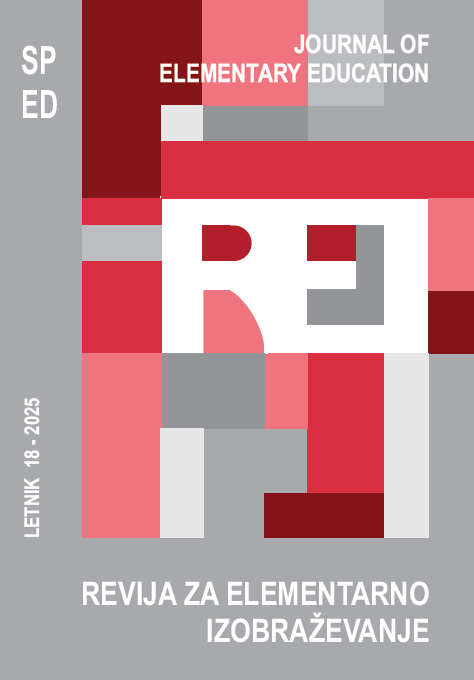Vloga izkušenj v gozdu za dobro počutje in odpornost otrok
DOI:
https://doi.org/10.18690/rei.5395Ključne besede:
dobro počutje otrok, odpornost, izkušnje v gozdu, izobraževanje v gozdu.Povzetek
Zaskrbljujoče težave (duševnega) zdravja otrok in mladih, ki so se še povečale zaradi pandemije in strahov, povezanih z okoljem, vodijo do vprašanja, kako lahko otroke pripravimo na vse zapletenejši svet in posledice – bolj aktualno kot kadar koli prej. V članku zato obravnavamo pomen odpornosti, dobrega počutja in doživljanja narave za razvoj otrok, zlasti s preživljanjem časa v gozdu. Doživljanje gozda namreč krepi imunski sistem, zmanjšuje stres, spodbuja socialne in motorične spretnosti ter lahko tako pozitivno vpliva na dobro počutje otrok in razvoj odpornosti.
Prenosi
Literatura
Ahnert, L. (2019). Frühe Bindung. Entstehung und Entwicklung (4th ed.). Reinhardt.
Andresen, S., and Viernickel, S. (2022). Kindliches Wohlbefinden – Child Wellbeing. Frühe Bildung, 11(3), 105–106. https://doi.org/10.1026/2191-9186/a000580
Annerstedt, M., Östergren, P. O., Björk, J., Währborg, P., and Grahn, P. (2013). Inducing physiological stress recovery with sounds of nature in a virtual reality forest. Physiology & Behavior, 118, 240–250. https://doi.org/10.1016/j.physbeh.2013.05.004
Arnold, M., Schilbach, M., and Rigotti, T. (2023). Paradigmen der psychologischen Resilienzforschung: Eine kleine Inventur und ein Ausblick. Psychologische Rundschau, 74(3), 154–165. https://doi.–org/10.1026/0033-3042/a000627
Arvay, C. G. (2019). Mit den Bäumen wachsen wir in den Himmel: Autistische Kinder mit der Heilkraft des Waldes fördern (1st ed.). Goldmann.
Asselmann, E. (2021). Gesundheitsbezogene Resilienz. In R. Haring (ed.), Gesundheitswissenschaften (pp. 295–304). Springer Reference Pflege – Therapie – Gesundheit. https://doi.org/10.1007/9–78-3-662-54179-1_26-1
Bancalari, K. (2021): Waldkindergärten in Österreich. Elementare Bildung im Wald. Wien: Bundesforschungszentrum für Wald.
Ben-Arieh, A. (2008). Indicators and indices of children's wellbeing: Towards a more policy-oriented perspective. European Journal of Education, 43(1), 37–50. https://doi.org/10.1111/j.1465-3435.2007.00332.x
Bradshaw, J., Hoelscher, P., and Richardson, D. (2007). An international comparison of child wellbeing: The role of economic resources, parenting, and policies. Children and Youth Services Review, 29(2), 150–157. https://doi.org/10.1016/j.childyouth.2006.05.011
Bradshaw, J., and Richardson, D. (2009). An index of child wellbeing in Europe. Child Indicators Research, 2, 319–351. https://doi.org/10.1007/s12187-009-9037-7
Branco, A. (2023). Wald- und Naturkindergruppen in Österreich. Ergebnisse der Internetrecherche. https://www.waldpaedagogik.at/fileadmin/user_upload/Praesentation_Stakeholdersitzung_Branco.pdf
Bundesforschungszentrum für Wald. (2021). Waldkindergärten: Bildung und Betreuung in der Natur. https://www.bfw.gv.at
Chawla, L. (2007). Childhood experiences associated with care for the natural world: A theoretical framework for empirical research. Children, Youth and Environments, 17(4), 144–170.
DAK-Gesundheit. (2024). Präventionsradar 2024: Gesundheit und Wohlbefinden von Kindern und Jugendlichen in Deutschland. https://www.dak.de/dak/unternehmen/reporte-forschung/praeventionsra–dar-2024_77378
Denham, S. A., Bassett, H. H., and Wyatt, T. (2012). The socialization of emotional competence. In A. A. Vangelisti, and D. Perlman (eds.), The Cambridge handbook of personal relationships (pp. 637–651). Cambridge University Press. https://doi.org/10.1017/CBO9780511606632.036
Evans, B. T. R., Murris, R., and Dew, K. (2018). The impact of social support on resilience in the face of stress. International Journal of Environmental Research and Public Health, 15(4), Article 789. https://doi.org/10.xxxx/ijerph.2018.789
Fischer, U. (2010). Bindungs-Explorations-Balance. Retrieved May 26, 2013, from http://www.inklusion-online.net/index.php/inklusion/article/view/42/49
Fröhlich-Gildhoff, K. and Rönnau-Böse, M. (2016). Resilienz im Kita-Alltag. Herder
Fyfe-Johnson, A. L., Hazlehurst, M. F., Perrins, S. P., Bratman, G. N., Thomas, R., Garrett, K. A., Hafferty, K. R., Cullaz, T. M., Marcuse, E. K., and Tandon, P. S. (2021). Nature and children’s health: A systematic review. Pediatrics, 148(4), 72–94. https://doi.org/10.1542/pe–ds.2020-049155
Prenosi
Objavljeno
Številka
Rubrika
Licenca
Avtorske pravice (c) 2025 Evelyn M. Kobler

To delo je licencirano pod Creative Commons Priznanje avtorstva 4.0 mednarodno licenco.
